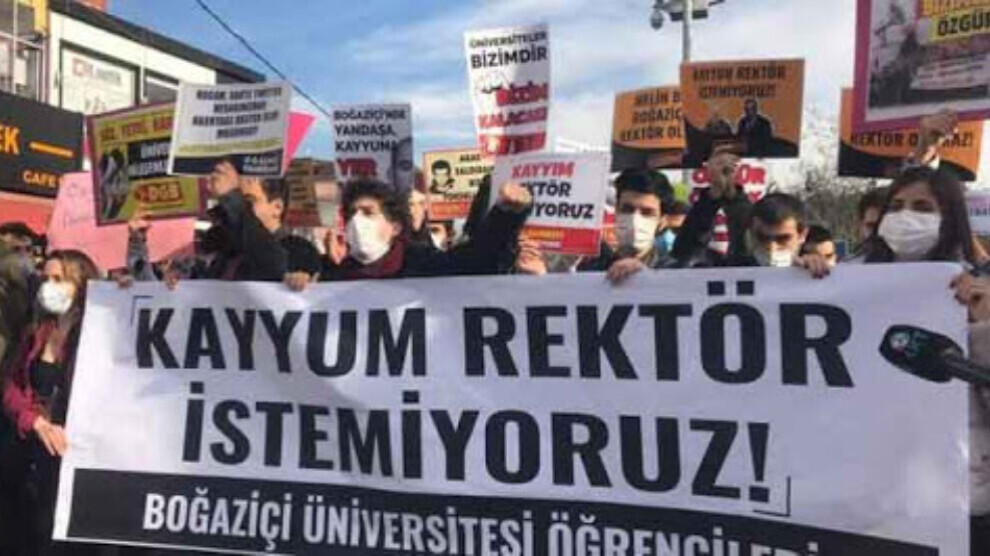Students protest against imposition of university rector continues
Students at Istanbul's Boğaziçi University are determined to continue their resistance against the appointment of an AKP politician as rector.
Students at Istanbul's Boğaziçi University are determined to continue their resistance against the appointment of an AKP politician as rector.

With the appointment of five university rectors, Recep Tayyip Erdogan triggered violent protests at Turkish universities. The interference of the president in the nomination of rectors is an authoritarian act that has widespread effect. In particular, the appointment of AKP member Melih Bulu as head of Istanbul's Boğaziçi University has triggered a protest that had not been seen at Turkish universities for a long time. Despite police violence and waves of arrests, the protests continue.
Targeting the universities after the attempted coup in 2016
On 12 September 1982, two years after the military coup, the University Council (YÖK), the central state control body for universities, was created on the basis of Article 131 of the Turkish Constitution, becoming crucial for the election of university rectors. After the end of the military junta, the universities did gain a certain degree of autonomy, even if this never meant absolute freedom of expression or a real right to vote for the appointment of rectors. But that relative autonomy was erased with the switch to the presidential system, through which Erdogan also secured access to the universities. During the state of emergency that followed the attempted coup in July 2016, the universities were deprived of the right to elect their directors themselves. The emergency situation prevented strong opposition from organising. Since the one-man regime came into force, Erdogan has been authorized to appoint rectors at universities.
Kurdish provinces know this trustee regime for a long time
The protests at Boğaziçi University represent a new beginning for universities and are not only taking place on campus, but also on the streets. Teaching staff have also protested since the day Bulu was appointed as rector. On 21 January a large protest took place in Istanbul's Kadiköy district. The students explained: “We know this mentality of trustee administration from the stripping of the democratic will of Kurds. In Kurdish cities, the forced administration steals the active and passive right to vote of citizens. This mentality lays claim to the bodies of women and incites attacks against the LGBTI+ community, for example.”
The students listed their demands as follows: resignation of administrators at universities, democratic elections of rectors by teachers, students and staff at universities.
Government tries to get protests under control
ANF spoke to some of the participants in the student protests, who, for security reasons, prefer avoiding giving their names. One person in the group said: “The appointment of trustees in municipalities and universities is a result of Erdoğan's pursuit of total control. Of course, we do not believe that the appointment of the rector of Boğaziçi University is a special case.”
As to the attacks on the university, someone else said: “Erdoğan has a particular hatred of this university because it is not conservative. He tries to get it under his control. This has happened before. We also want to say that we are not against this man as a person, we are against a rector imposed on us. Of course Melih Bulus's candidacy for the AKP and the fact that he comes from outside the university are important factors in our protest. His declaration when appointed, was just so bad. He wants to transform Boğaziçi University into a company. This university with its liberal values is to be transformed into a corporation that corresponds to the neoliberal policy of the AKP and brings profit."
Protest must spread to all universities
To prevent this and to defend the last bastions of scientific and academic freedom, the students are ready to hold on to their resistance. Graduates, students and teaching staff go to the barricades, but organize themselves separately. “In 2016 the pressure from the police was very high. It was the same with the protest against the occupation of Afrin. The repression continues now. The university is surrounded and students are recruited as informers,” says one of the students. “The protests used to end at this point, but now they are growing. The state does not manage to marginalize the resistance through manipulation and defamation as terror propaganda. As students, we are trying to break the police blockade in Hisarüstü and Boğaziçi and to extend our protests beyond the universities. With this in mind, we protested in Kadıköy on 21 January. We are working on including the other universities, Istanbul University, the students in Dicle, Ege and Ankara, because there is a forced administration regime everywhere."